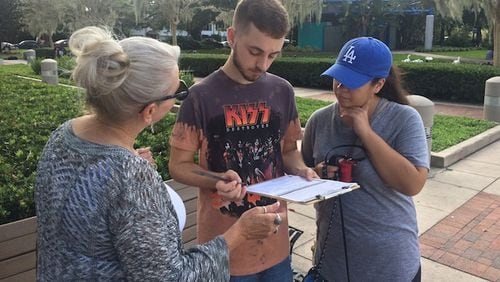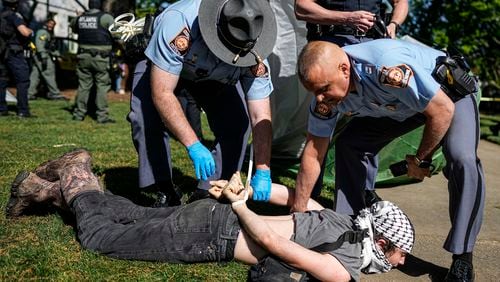In Washington state, a local Democratic leader wants people registered to vote at birth.
In Nevada and New Mexico, a liberal group is pressuring the legislatures to let people register when they get driver's licenses.
In Ohio, progressive activists have thrown their support behind a mayoral candidate because she fights with Republicans about voting access.
Across the country, Democrats and their allies are plotting a quiet and disjointed but considerable push to make voting easier by dismantling registration barriers and promoting candidates who want to expand voting rights. It's all an effort to reshape the electorate by creating new Democratic voters.
If successful, the effect could be profound. The more people who vote, the better Democrats usually do in everything from a marquee presidential election to little-noticed municipal race.
"Democrats have been on the defensive," said Tina Podlodowski, chairwoman of the Washington State Democratic Party. "We've tried to get on the offensive, and I think people are starting to listen more and more to that."
Her plans to improve voter access in Washington state — which mails ballots to its residents — including paying for the return postage. The stamps are too expensive and hard to purchase for some elderly and low-income voters, said Podlodowski, herself a former candidate for secretary of state.
The idea might sound far-reaching, but the Democratic leader says other countries take even bolder steps to make sure everyone can vote — including registering people at birth.
"If you look at different countries, European countries or Scandinavian countries, basically folks walk in when they're 18 and they just start voting and don't have to register," she said. "Because they were registered at birth."
The push to expand voting rights started in 2013, according to Jonathan Brater, counsel at the Brennan Center for Justice's Democracy Program. Since then, 26 states have passed laws that have made voting easier.
That's more than the 20 states that have made voting more restrictive, he said, in part thanks to bipartisan efforts in states such as West Virginia, where Republicans last year backed the creation of an automatic voter-registration system.
"We shouldn't lose sight of the fact there are some real opportunities to make voting easier," Brater said. "And in fact, a majority of states have done something to make voting easier in the last three years."
Still, in most places, Democrats have led the charge, spearheaded by a coterie of progressive organizations that have taken a special interest in voting rights.
America Votes, a nonprofit group that advocates for progressive causes, has been involved in efforts to expand voting rights in New Hampshire, lobbying lawmakers and helping to stage rallies in support of their goals.
The group, mindful of trying to earn bipartisan support, has taken lower-key approaches to backing automatic voter-registration efforts in New Mexico and Nevada this year. The measure failed to become law in either state, but in Nevada, voters will have a chance to vote on the proposal in a ballot initiative next year.
Another group, Democracy for America, has decided to make voting rights a criterion for endorsements. The group has thrown support to Yvette Simpson for mayor of Cincinnati after she fought for voting rights for her constituents as a city councilwoman.
It might seem small-bore, but liberal advocates say installing elected officials who back expanding voting rights — even in non-legislative positions — is an important part of their strategy.
"Both in the short and long term, we need leaders in Washington and statehouses across the country who understand that we need to be working to make it easier to vote, not harder," said Neil Sroka, Democracy for America spokesman. "The easiest way to get national and state leaders committed to expanding access to the ballot is by electing local leaders today who understand and have already taken action to protect voting rights in their local communities."
Democrats acknowledge that much of their time and energy of late is spent defending voting rights in red or purple states controlled by the GOP, which has pushed laws that make voting more restrictive. Republicans leaders say their efforts are necessary to combat voter fraud, though experts say instances of documented fraudulent votes are rare.
It's why, said Podlodowski, the Democratic Party might eventually consider a more sweeping change to the existing laws: pushing a national standard for voting access. Currently, each state makes up its own rules and regulations.
"Maybe it's time to have that discussion," she said. "What makes sense at a national level?"






